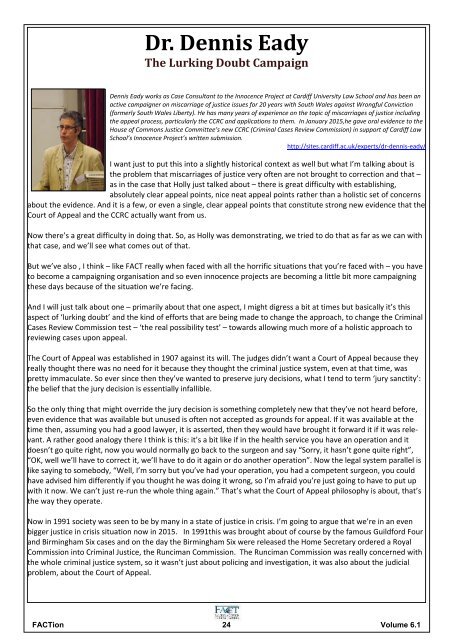FACTion-6.1-web-version
FACTion-6.1-web-version
FACTion-6.1-web-version
Create successful ePaper yourself
Turn your PDF publications into a flip-book with our unique Google optimized e-Paper software.
Dr. Dennis EadyThe Lurking Doubt CampaignDennis Eady works as Case Consultant to the Innocence Project at Cardiff University Law School and has been anactive campaigner on miscarriage of justice issues for 20 years with South Wales against Wrongful Conviction(formerly South Wales Liberty). He has many years of experience on the topic of miscarriages of justice includingthe appeal process, particularly the CCRC and applications to them. In January 2015,he gave oral evidence to theHouse of Commons Justice Committee’s new CCRC (Criminal Cases Review Commission) in support of Cardiff LawSchool’s Innocence Project’s written submission.http://sites.cardiff.ac.uk/experts/dr-dennis-eady/I want just to put this into a slightly historical context as well but what I’m talking about isthe problem that miscarriages of justice very often are not brought to correction and that –as in the case that Holly just talked about – there is great difficulty with establishing,absolutely clear appeal points, nice neat appeal points rather than a holistic set of concernsabout the evidence. And it is a few, or even a single, clear appeal points that constitute strong new evidence that theCourt of Appeal and the CCRC actually want from us.Now there’s a great difficulty in doing that. So, as Holly was demonstrating, we tried to do that as far as we can withthat case, and we’ll see what comes out of that.But we’ve also , I think – like FACT really when faced with all the horrific situations that you’re faced with – you haveto become a campaigning organisation and so even innocence projects are becoming a little bit more campaigningthese days because of the situation we’re facing.And I will just talk about one – primarily about that one aspect, I might digress a bit at times but basically it’s thisaspect of ‘lurking doubt’ and the kind of efforts that are being made to change the approach, to change the CriminalCases Review Commission test – ‘the real possibility test’ – towards allowing much more of a holistic approach toreviewing cases upon appeal.The Court of Appeal was established in 1907 against its will. The judges didn’t want a Court of Appeal because theyreally thought there was no need for it because they thought the criminal justice system, even at that time, waspretty immaculate. So ever since then they’ve wanted to preserve jury decisions, what I tend to term ‘jury sanctity’:the belief that the jury decision is essentially infallible.So the only thing that might override the jury decision is something completely new that they’ve not heard before,even evidence that was available but unused is often not accepted as grounds for appeal. If it was available at thetime then, assuming you had a good lawyer, it is asserted, then they would have brought it forward it if it was relevant.A rather good analogy there I think is this: it’s a bit like if in the health service you have an operation and itdoesn’t go quite right, now you would normally go back to the surgeon and say “Sorry, it hasn’t gone quite right”,“OK, well we’ll have to correct it, we’ll have to do it again or do another operation”. Now the legal system parallel islike saying to somebody, “Well, I’m sorry but you’ve had your operation, you had a competent surgeon, you couldhave advised him differently if you thought he was doing it wrong, so I’m afraid you’re just going to have to put upwith it now. We can’t just re-run the whole thing again.” That’s what the Court of Appeal philosophy is about, that’sthe way they operate.Now in 1991 society was seen to be by many in a state of justice in crisis. I’m going to argue that we’re in an evenbigger justice in crisis situation now in 2015. In 1991this was brought about of course by the famous Guildford Fourand Birmingham Six cases and on the day the Birmingham Six were released the Home Secretary ordered a RoyalCommission into Criminal Justice, the Runciman Commission. The Runciman Commission was really concerned withthe whole criminal justice system, so it wasn’t just about policing and investigation, it was also about the judicialproblem, about the Court of Appeal.<strong>FACTion</strong> 24 Volume <strong>6.1</strong>


